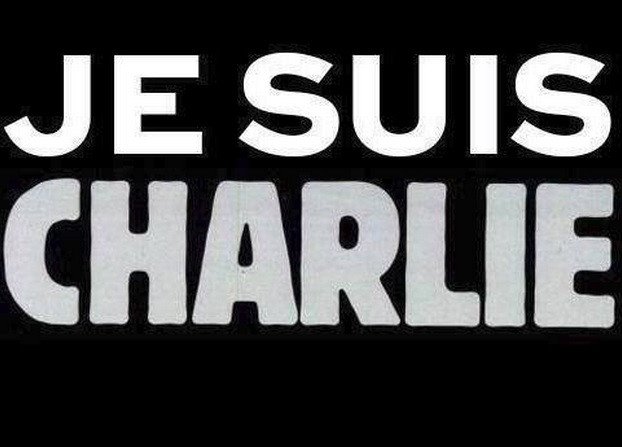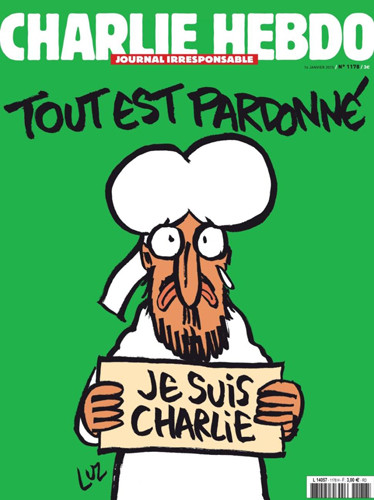Charlie Hebdo Prophet Mohammed cover: The media debate on whether to publish new cartoon that will offend some Muslims

Charlie Hebdo was always going to come out fighting. In the first issue after 10 of its journalists were murdered by Islamic terrorists, as well as the two police officers protecting their offices, Charlie Hebdo splashed with another satirical cartoon of the Prophet Mohammed.
The question is: who would follow in republishing the cartoon? For all of the statements of Je Suis Charlie solidarity in the media, the editors of many publications have decided not to publish Charlie Hebdo's depictions of Mohammed.
Editors and journalists in British newsrooms will all be having the same debate, wrestling with the same arguments and concerns about publishing the cartoons. Debates on free expression and offence; on the duty of care to staff amid fear of reprisals; on inflaming racial or religious tensions.
Of the traditional national media in the UK, only two published the latest front cover: the Guardian and The Independent. Both of which published small images of the cover on an inside page of the newspaper. Online, they ran the image halfway down the report, but carried a warning at the top.
The Telegraph did not run the new Charlie Hebdo cover in print, but chose to run a cropped version online instead.
And the BBC, which has come in for criticism in the past for not showing the Danish cartoons of Mohammed published by Danish magazine Jyllands-Posten, showed Charlie Hebdo's Mohammed covers on several occasions, most notably on Newsnight when it was held up for the camera by presenter Evan Davis.
Other cartoons depicting Mohammed had also featured in BBC News coverage and on Panorama.
"The BBC is a news organisation committed both to free speech and respecting our audiences in the UK and around the world," said a BBC spokeswoman.
"We have made the editorial judgment that the images are central to reporting the story and will continue to report the story in a careful and considered manner."

Digital media were less coy about publishing the pictures, already being shared widely across the internet on social media and blogs, with Business Insider and Buzzfeed among those who ran Charlie Hebdo's post-attack cover in full.
"[We] decided to publish the cartoon, given the general interest in the news," wrote Business Insider.
"We're hoping that people with devout religious beliefs understand that this is not a provocation, and can respect the freedom of the press during this crisis."
Index on Censorship, the free expression campaign group, called on all UK editors to publish the cartoons in solidarity with Charlie Hebdo and to support the liberal principle of free speech.
The Sun, a forthright tabloid which doesn't often shy away from causing offence, chose not to publish the latest Charlie Hebdo cover. Similarly the Daily Mail, a mid-market tabloid which has been accused by its critics of demonising Muslims, chose not to reprint the Mohammed images.
A spokesperson for the Mail has not yet returned IBTimes UK's call. A spokesman for The Sun said the paper had no comment to make on the latest decision not to publish a Charlie Hebdo cartoon, but directed me to previous comments by Stig Abell, managing editor of The Sun.
In a Sky News debate, Abell justified a decision not to publish Charlie Hebdo's Mohammed cartoons in the aftermath of the massacre because free expression is about freedom of choice – including the freedom to choose not to publish something. He said the paper makes different editorial judgments each day.
"I don't think anyone would accuse the newspaper of being timid or frightened to offend people," Abell said, adding that this was not a decision born of fear.
A spokesman for The Daily Mirror, another tabloid which covered the Charlie Hebdo cover story without using a picture of it, declined to comment.
At IBTimes UK we were asking ourselves the same questions. Some argued for the publication of the latest Charlie Hebdo cover in full on the grounds that it is relevant to the story; we should not be the ones arbitrating on what some Muslims will find offensive or not; it should be done in support of the ideal of free expression upon which our jobs as journalists rely; and that we would give no other such special treatment to other faiths, belief systems and political ideologies.
George Pitcher, editor-in-chief of IBTimes UK, wrote in a staff email:
We can all agree that we support free speech, free expression and a free press. At the same time, I have a responsibility to maintain a consistency on what sort of publication we are and not gratuitously to cause offence to readers.
I would add that I also have a duty of care to all our staff, so that decisions taken at a senior editorial level don't harm those who have not been party to those decisions.
On the issue of causing offence, we should address every illustrative decision on its own merits – if news values justify publication, we should and we will publish.
It's where we might sleep-walk into causing gratuitous offence that we must be careful. On my watch, we will not publish material that contributes to an incitement to racial or religious hatred.
And, whatever our own views, there are members of the Muslim community, who abhor violence and extremism, but who also find satirical cartoon images of their prophet deeply offensive. We must respect that. Furthermore, we must not unwittingly become an agent of Islamophobia.
In the end, a compromise was found between the two sides of the debate. The editors have allowed the full publication of the Charlie Hebdo cover, without blurring or pixelation, but behind a digital veil so the user must click themselves to view the image. There is a courtesy warning.
© Copyright IBTimes 2025. All rights reserved.






















